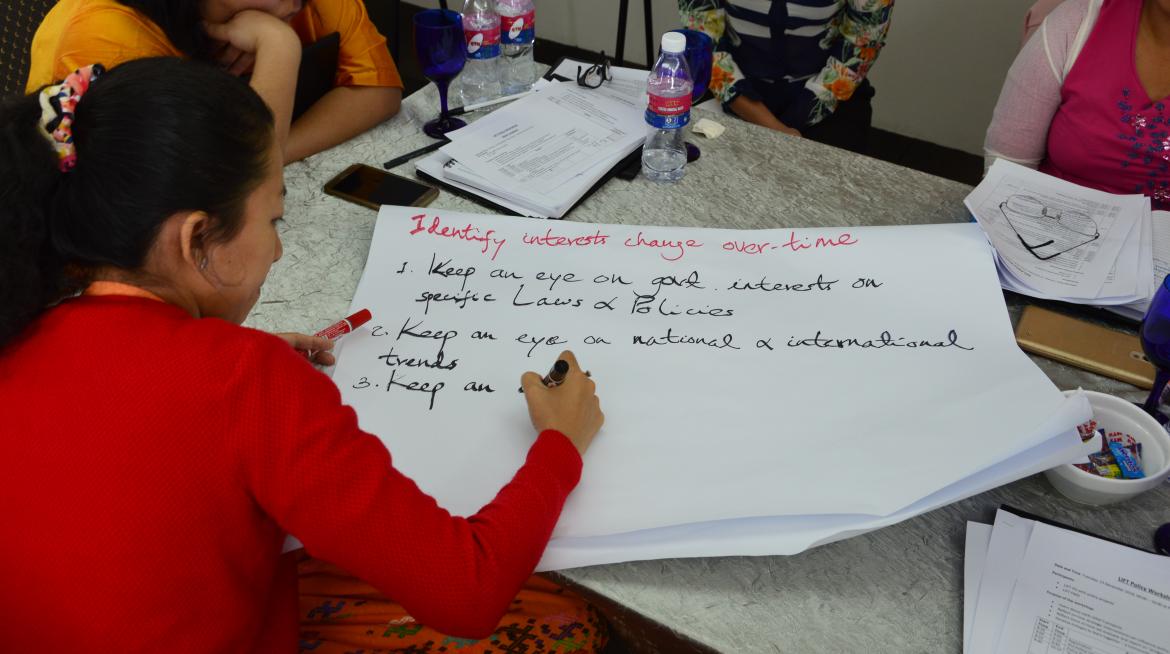
LIFT Fund Management Office (FMO) held a Policy Workshop with LIFT Implementing Partners (IPs) at Hotel Parami on 13 December, 2016. The workshop was the first of its kind and provided an opportunity for LIFT FMO and IPs focused on policy work in Myanmar to learn about each other’s projects. It also provided an opportunity for participants to reflect on how strategic approaches to policy processes can promote more effective policy outcomes. This workshop marked an important step towards learning from each other by identifying common constraints and opportunities.
LIFT’s new policy specialist Brett Ballard started the workshop by observing how policy processes were complicated and involved a complex mix of competing interests.
“Our job is to ‘make sense of the mess’ and develop more strategic approaches for influencing and informing policy processes,” Mr Ballard said.
He discussed several components of strategic policy processes, including:
- identifying policy focal areas
- mapping stakeholder interests and influence
- assessing opportunities and constraints in the policy environment
- developing appropriate actions or interventions.
This was followed by a Policy Market Place, where five of the participating IPs explained their policy work by illustrating it on posters.
Participants were invited to visit each of the presentations, ask questions, and share their own experiences. The Policy Market Place itself was a valuable learning experience as it allowed the presenters to describe and discuss aspects of their work relating to policy with other IP colleagues. Another layer was added with ‘Mystery shoppers’ being asked to investigate four topics during the market place: external constraints; external opportunities; internal constraints, and internal opportunities. Their observations helped generate a collaborative analysis of some of the strengths, weaknesses, opportunities and constraints observed from the policy presentations. The mystery shoppers identified several issues:
The workshop participants also met in groups to discuss questions regarding the effectiveness, relevance, and sustainability of policy work. They considered issues pertaining to assessing effective contributions to policy making;identifying relevant stakeholders and their respective interests, and ensuring sustainable policy outcomes.
The groups identified the importance of understanding the needs and interests of other stakeholders in the policy area, and the need to constantly assess changes in the policy environment as key messages. The need to be opportunistic and able to respond to opportunities as they emerge was also an important observation of the working groups.
Building on the previous session, LIFT Monitoring and Evaluation Officer Anne Coghlan emphasized the importance of incorporating monitoring into policy planning and strategy development. After introducing some of the tools of Monitoring and Evaluation for Accountability and Learning (MEAL), the participants assessed the usefulness and challenges of three different monitoring tools: Policy Activity Tracking Sheet, Strategy Testing, and Contribution Analysis. The group found that these tools enabled long term policy objectives to be tracked, and themes and the project’s contribution to policy goals to be identified. The session stressed the intertwined nature of monitoring and planning in policy work. The group also gave recommendations on how to use and improve the tools and discussed challenges, such as the duplication of information in different reporting templates and confusion over the level of detail required for effective policy planning and monitoring. These discussions highlighted how the planning and monitoring of policy work is as much an art as it is a science.
In the closing remarks of the day LIFT’s Policy Specialist Brett Ballard discussed the potential next steps for the policy group, including setting up a community of practice to help foster linkages for shared learning that would help strengthen capacities to inform policy outcomes in support of poverty reduction and improved rural livelihoods. The outcomes of the day’s sessions will help guide next steps and enable LIFT FMO to further tailor its support and guidance to the needs of the IPs and inform future policy activities.


